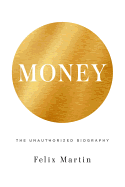Jack Covert Selects - Money
March 14, 2014
Money: The Unauthorized Biography by Felix Martin, Alfred A. Knopf, 320 pages, $27. 95, Hardcover, March 2014, ISBN 9780307962430 Money, as we are told in classical economics, evolved from a system of barter known in the simpler societies of our ancestors.
Money: The Unauthorized Biography by Felix Martin, Alfred A. Knopf, 320 pages, $27.95, Hardcover, March 2014, ISBN 9780307962430
Money, as we are told in classical economics, evolved from a system of barter known in the simpler societies of our ancestors. But, as the anthropological and historical record seems to indicate, no such society has ever existed, and Felix Martin argues persuasively in his excellent new “unauthorized biography,” of money—aptly titled Money: The Unauthorized Biography—that this conventional view of money’s origins is entirely false.
And what a great thing that is, because a whole new world is opened up to the reader of Martin’s book. The actual history and nature of money as he tells it is a much richer, more complex, and more interesting story. It is a story that begins with the invention of literacy, numeracy, and accounting in the bureaucracies that sprang up in the first cities of Mesopotamia, winds its way through the tribal societies that existed concurrently in Aegean Greece with their notion of equal social value in the distribution of ritual sacrifice, gift exchange, and war spoils, and results in the invention of economic value and the world’s first monetary societies.
It is with that history that the author introduces an alternative view of money. Money in this view is not, as John Locke assumed “a commodity, and its value … determined like that of other commodities.”
[M]oney is not really a thing at all but a social technology: a set of ideas and practices which organize what we produce and consume, and the way we live together.
But that’s just the beginning of the paradigm shift this book offers. You’ll see the supporting evidence for this view in how the Irish economy survived almost completely unscathed when its entire banking system shut down for six and a half months in 1970. You’ll learn of the shadow banking systems that emerged in the early years of this century when Argentina’s monetary system was in crisis, and in the aftermath of the collapse of the Soviet Union. You’ll hear why Lawrence Summers said that, while confronting our most recent financial meltdown, the “orthodox economic theory constructed since the Second World War” was “a vast edifice” and “virtually useless,” and learn what “obscure and unfashionable” economic thinkers of the past Mr. Summers turned to—key among them Walter Bagehot, longtime editor of The Economist in the late 1800s, who you’ll hear a lot from in the book.
And you’ll learn why one of the most important functions of the modern state is to issue and control its currency. Why, for example:
One of the most provocative acts of the British Crown’s jurisdiction over its American possessions was to outlaw the colonies’ printing of their own monies—and one of the first acts of the Continental Congress was to authorize the printing of a new currency to finance the War of Independence.
And you’ll learn why it’s imperative that we shift our view of money from commodity to social technology, and how that shift may very well save the capitalist system it is currently under serving. Put quite simple, you’ll learn a lot about money, which seems like a pretty good reason for a businessperson to pick up a book.


